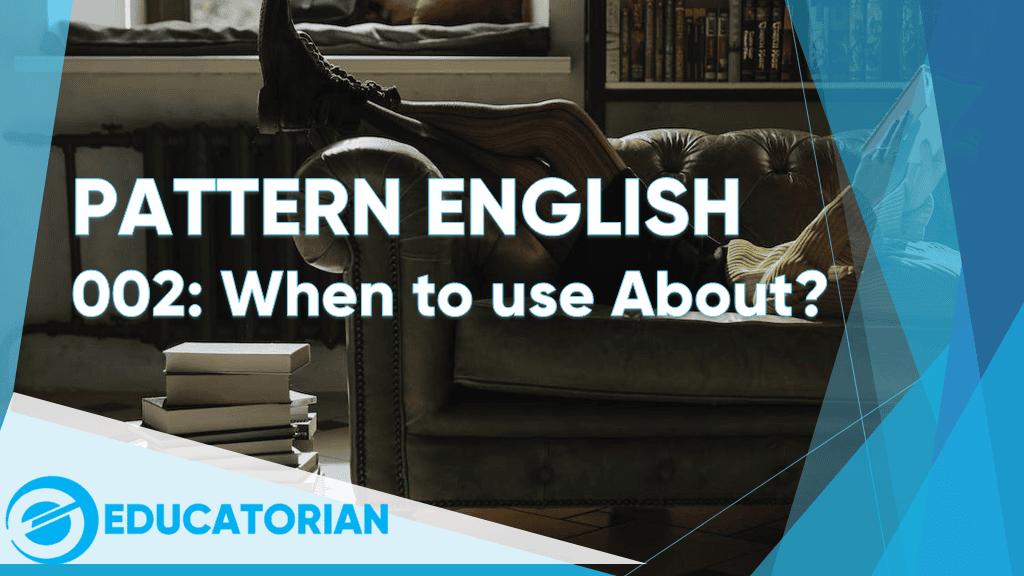pattern english

Pattern English 002: When to Use About?
Pattern English 002: When to Use About?
1. About – Identifies Topic
noun + be + about + noun
- The argument is about politics.
- The article is about climate change.
- The book is about adventure.
- The conversation is about future plans.
- The disagreement is about a misunderstanding.
- The discussion is about technology.
- The lecture is about history.
- The movie is about romance.
- The news is about current events.
- The play is about family dynamics.
- The program is about fitness.
- The report is about market trends.
- The speech is about inspirational stories.
- The story is about friendship.
noun + about + noun
- Assurance about safety is crucial in this workplace.
- Complaint about customer service was addressed promptly.
- The comment about the food was positive.
- Gossip about their relationship spread quickly.
- The lie about the missing keys was uncovered.
- The question about the project’s deadline remains unanswered.
- The statement about the new policy is clear.
- Discovering the truth about the situation was a relief.
verb + about + noun
- We all agree about the need for better communication in the team.
- They argue about politics all the time.
- He brags about his accomplishments constantly.
- Do you care about the environment?
- She complains about her commute every day.
- I often dream about traveling the world.
- I forget about my worries when I’m with friends.
- She groans about having to do homework.
- We hear about the latest news from our neighbors.
- They joke about each other’s quirks.
Expressions
to see about— to delay a decision until more information is known
Let’s see about signing the contract after we receive the final cost estimates.
to get information about
I’ll call the customer service hotline to see about the status of my order.
to find out about—to get information about
I want to see about the available courses at the local university before making a decision on further education.
verb + noun + about
- She asked her friend about the party details.
- I found out from the news about the weather forecast.
- Do you know anything about the new restaurant in town?
- We learned from our teacher about the upcoming test.
- He said something interesting about his recent trip.
- She asked quite a bit about the company’s financial performance.
- I found out a lot about the history of ancient civilizations.
- Do you know something about the upcoming staff meeting?
- We learned very little about the professor’s research interests.
- He said nothing about his recent vacation plans.
verb + indirect object + about + noun
- She advised her friend about the best restaurants in town.
- He asked his colleague about the progress of the project.
- Don’t bother your sister about borrowing her car.
- I contacted the customer service representative about the delivery.
- The manager harassed the employees about their performance.
- They questioned the professor about the upcoming exam.
- I reminded my roommate about the rent payment.
- She taught her son about the importance of honesty.
- He told his parents about his plans to study abroad.
- I wrote a letter to the school principal about the safety concerns.
adjective + about + noun
- She’s always so understanding about her friends’ problems.
- He can be quite rude about people’s fashion choices.
- Sarah is very kind about helping others in need.
- Don’t be mean about your sister’s mistake; she’s learning.
- The teacher was sweet about giving extra help to struggling students.
- John is charming about making everyone feel welcome at the party.
- It’s nice of you to be so helpful about organizing the event.
- Despite the situation, she remained unkind about her ex-boyfriend.
- I appreciate how he’s been nice about sharing his notes with me.
- Some people can be nasty about criticizing others’ work.
2 About can identify the cause of an emotion or condition.
adjective + about + noun
- She’s excited about the upcoming vacation.
- He’s optimistic about the team’s chances in the tournament.
- Don’t be silly about making a small mistake.
- They’re concerned about the safety of the neighborhood.
- I’m nervous about the big job interview.
- She’s upset about the argument with her friend.
- We’re happy about the news of their engagement.
- He’s mad about the unfair treatment at work.
- I’m worried about the family’s financial situation.
- Don’t get pessimistic about the challenges ahead.
- She’s bashful about receiving compliments.
- He’s objective about analyzing the data.
- They’re glad about the opportunity to travel.
- I’m right about the solution to this problem.
- She’s confused about the directions to the restaurant.
- He’s concerned about his son’s academic performance.
- Don’t act crazy about the minor inconvenience.
- She’s unhappy about the rainy weather during the picnic.
- I’m sick about missing the important meeting.
- They’re angry about the late delivery of the package.
3 About (adverb) can mean approximately.
about + number
- The book costs about $15.
- We’ll be there in about 10 minutes.
- She has about five cats.
- The concert starts in about an hour.
- It will take about two hours to finish the project.
4 About can mean in all parts of.
be + noun + about + noun
- There is a lot of chatter about town.
- There’s a sense of anticipation about the office.
- The rumors about the town suggest a big event.
- They had a heated discussion about the project.
- There’s an air of excitement about the carnival.
past participle of verb + about + noun
- Papers were scattered about the classroom.
- Tools were strewn about the workshop.
- Leaves were scattered about the garden.
- Toys were thrown about the playroom.
- Books were scattered about the library.
5 About can describe a noun.
something/nothing + (adjective) + about + noun
- There’s something adorable about the way kittens play with yarn.
- There’s nothing attractive about the abandoned building down the street.
- There’s nothing bad about the homemade cookies she baked.
- There’s something cute about the way children make up stories.
- There’s something exotic about the spices in this dish.
- There’s something fascinating about the history of ancient civilizations.
- There’s something familiar about the melody of that old song.
- There’s something fishy about the excuses he keeps giving.
- There’s nothing funny about the recent increase in taxes.
- There’s something good about spending time in nature.
6 About can mean in all directions.
motion verb + about + noun
- He ran about the park searching for his lost keys.
- She walked about the city to explore its hidden gems.
- The kids jumped about the playground with excitement.
- We moved about the room rearranging the furniture.
- They looked about the forest for signs of wildlife.
motion verb + about (adverb)
- The cat pounced about playfully with a feather toy.
- The dog sniffed about curiously in the garden.
- She stumbled about clumsily in the dark room.
- They darted about swiftly to catch the escaping butterfly.
7 About (adverb) can mean almost.
be + about + adjective
- The cake is about perfect; just a few more minutes in the oven.
- He is about ready to start his presentation; he’s just rehearsing one more time.
- The painting is about complete; just a few more brushstrokes.
- The meal is about done; it just needs a final garnish.
- The day is about through; the sun is setting, and it’s time to relax.
- The puzzle is about perfect; all the pieces fit perfectly.
- The marathon runner is about ready to cross the finish line.
- Check my personal website.
- Check IELTS Rizz
- Check Other Pattern English Lessons

Ian Tanpiuco is an ESL and virtual assistant. With a decade of experience, he has become an expert in his field. Dedicated to helping others achieve their goals, Ian works tirelessly in the classroom or as a virtual assistant.
Ian
0
Tags :

